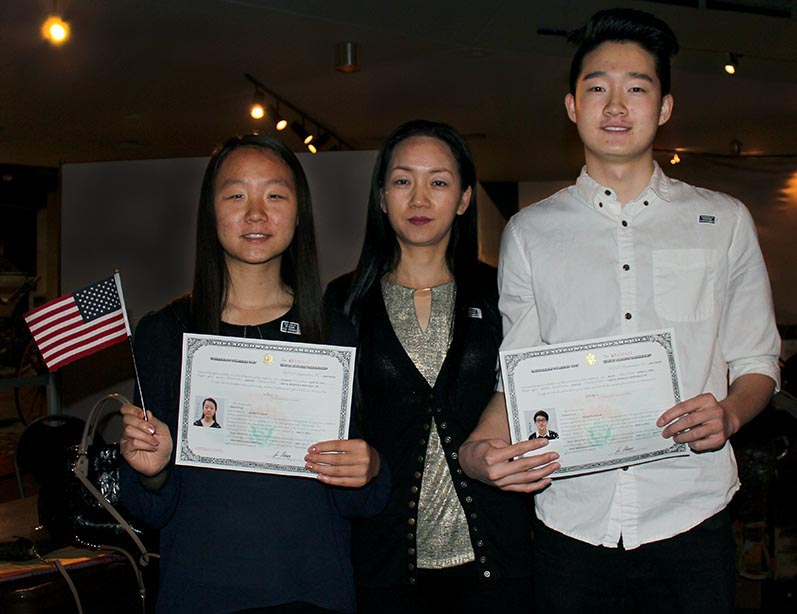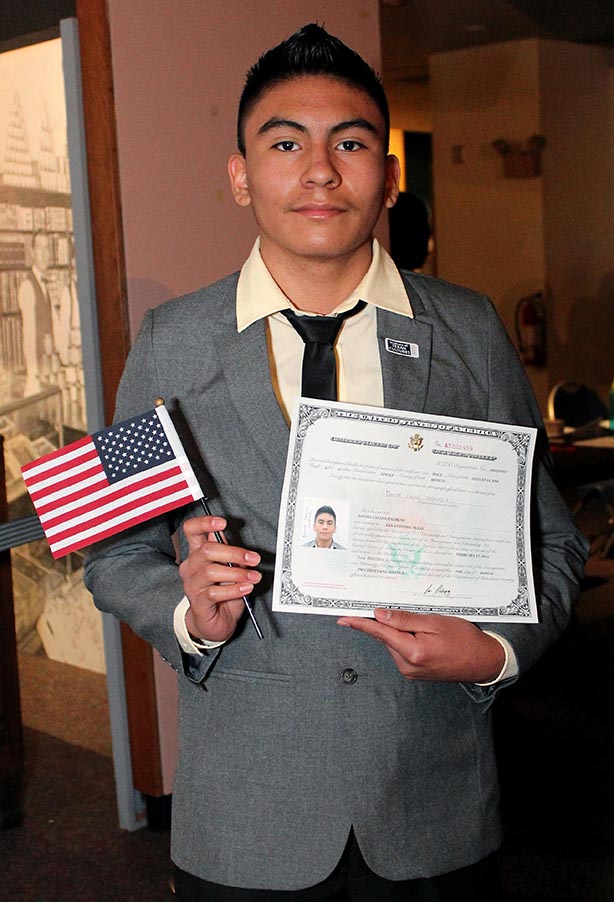By Daniel Serna and Leann Jimenez
Families welcomed 205 fresh-faced citizens on March 22 during a children’s naturalization ceremony held at the Institute of Texan Cultures.
The institute holds eight naturalization ceremonies a year and joins with the United States federal court, granting naturalization to immigrants and children who derive citizenship from their parents.
With bright futures ahead, the children and their families showed their pride in America as the ceremony unfolded. The children walked into the institute as immigrants and left as new citizens of the United States of America. Many said they looked forward to voting and pursuing higher education.
“To me this is what it’s all about: Citizenship, it’s the end result,” said a U.S. Immigration and Citizenship Services Officer overseeing the ceremony. “The ones for the kids are awesome because they got their citizenship from their parents’ long journey and they are the reason they are here, so we love doing these.”
With bright eyes and nervous smiles, children anxiously awaited the citizenship and immigration services officer to hand them their Certificates of Naturalization.
According to the Institute of Texan Cultures website, immigration and naturalization are controlled by the McCarran-Walter Act of 1952, which the Department of Justice administers.
The naturalization ceremony hosts more than 2,000 people annually.
Certificates of Naturalization are given to individuals born abroad, but are U.S. citizens at birth through their parents. They can also be granted to individuals who became citizens after birth, but before the age of 18, according to the U.S. Citizen and Immigration Services website.
Naturalized citizens have all the rights of a natural born citizen except the right to become President of the United States.
A naturalized citizen may run for the House of Representatives after seven years of citizenship and for the Senate after nine years.

Before children can begin the naturalization process, their parents must be United States citizens.
Debbie Cannon, U.S. Citizenship and Immigration Services public affairs officer, said the process takes about eight months to approve. For some children, the wait is even longer.
Wenxin Li, an 18-year-old woman from China, said she was proud of her father who became an American citizen.
“We became citizens through my dad. He’s just working so hard, like studying American history,” Li said. “It took him almost a year to get to know more about America and then he passed his naturalization test. So yeah, we are so blessed.”
Wenxin’s brother, Yuhang Li, 16, also became a citizen. He said he looks forward to his future.
“There is more opportunities and benefits if you are a United States citizen,” Li said. “That’s why my parents let me become a United States citizen, and I want to see things differently to get myself a better future.”
The families in the audience watched with happiness. Some had tears of joy rolling down their faces as the journey to American citizenship was realized.

The lights dimmed, leading into an emotion-filled video. “Proud to be an American” by Lee Greenwood played. Photos flashed across the screen, each photo demonstrating what makes being an American great.
For the first time as naturalized citizens, the newly sworn-in citizens of the United States stood to say The Pledge of Allegiance. The room filled with great pride.
Daniel Castro, a 10th grader at Harlandale High School who came from Mexico, held his American flag with pride.
“It’s [an] honor to become a U.S. citizen,” Casto said, overcome with emotion, “Happy. Happiness.”
“More doors are open for me,” he said. “I can get a better job and more opportunities. I want to go to college and have a career.”
Many of the new citizens expressed a great desire for higher education. As citizens, they now have access to federal grants for higher education and can also apply for a U.S. passport.
Many of the young new citizens said they were excited for the opportunity to vote when they turn 18 years old.
Smarika Bahandari, 18, originally from Nepal, was thrilled about her naturalization. Bahandari derived her citizenship through her father, Kumar Bahandari, who gained his in 2014.
“I’m ready to vote,” she said. “I’m going to college this year, after summer, and it’s really very beneficial for me.”





